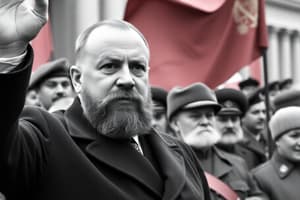Podcast
Questions and Answers
What were the primary causes of the Russian Revolution?
What were the primary causes of the Russian Revolution?
- Economic hardship, political freedom, and industrial progress
- Social harmony, economic prosperity, and strong infrastructure
- Religious freedom, technological advancement, and cultural development
- Economic hardship, political suppression, and social unrest (correct)
Who was a prominent revolutionary leader and founder of the Bolshevik Party?
Who was a prominent revolutionary leader and founder of the Bolshevik Party?
- Lenin (Vladimir Ilyich Lenin) (correct)
- Bukharin (Nikolai Ivanovich Bukharin)
- Tsar Nicholas II
- Trotsky (Lev Davidovich Trotsky)
Who played a pivotal role in orchestrating the October Revolution?
Who played a pivotal role in orchestrating the October Revolution?
- Lenin (Vladimir Ilyich Lenin)
- Trotsky (Lev Davidovich Trotsky) (correct)
- Bukharin (Nikolai Ivanovich Bukharin)
- Tsar Nicholas II
What eroded faith in the autocratic rule of Tsar Nicholas II?
What eroded faith in the autocratic rule of Tsar Nicholas II?
Who served as the President of the Petrograd Soviet during the Revolution?
Who served as the President of the Petrograd Soviet during the Revolution?
Which calendar was used in Russia at the time of the October Revolution?
Which calendar was used in Russia at the time of the October Revolution?
What role did the Bolshevik Party play in the emergence of the Soviet Union?
What role did the Bolshevik Party play in the emergence of the Soviet Union?
What societal shift did the Revolution bring about?
What societal shift did the Revolution bring about?
What type of economy was established as a result of the Revolution?
What type of economy was established as a result of the Revolution?
Which party spearheaded by Lenin played a crucial role in the emergence of the Soviet Union?
Which party spearheaded by Lenin played a crucial role in the emergence of the Soviet Union?
Flashcards are hidden until you start studying
Study Notes
Title: A Comprehensive Overview of the Russian Revolution
The Russian Revolution, a transformative event that transpired between 1917 and 1922, significantly shaped the course of world history. This article focuses on the causes, key figures, October Revolution, Bolshevik Party, and the impact of this revolutionary period on Russian society.
Causes of the Revolution
The primary causes of the Russian Revolution include economic hardship, political suppression, and social unrest. The country's feudal system, combined with a weak infrastructure, contributed to the growing discontent among the masses. The First World War took a heavy toll on Russia, exacerbating the country's economic crisis and eroding faith in the autocratic rule of Tsar Nicholas II.
Key Figures
The Russian Revolution brought to the forefront numerous influential figures, some of whom are as follows:
- Lenin (Vladimir Ilyich Lenin): A prominent revolutionary leader and founder of the Bolshevik Party, Lenin played a crucial role in both the October Revolution and the establishment of the Soviet Union.
- Trotsky (Lev Davidovich Trotsky): A prominent Bolshevik leader and military strategist, Trotsky played a pivotal role in orchestrating the October Revolution.
- Bukharin (Nikolai Ivanovich Bukharin): A prominent Bolshevik theorist, Bukharin was an influential member of the party's Central Committee and a key participant in the Revolution.
- Kamenev (Lev Borisovich Kamenev): A prominent Bolshevik leader, Kamenev served as the People's Commissar for Internal Affairs during the early years of the Soviet Union.
- Zinoviev (Grigory Yevseyevich Zinoviev): A prominent Bolshevik leader, Zinoviev served as the President of the Petrograd Soviet during the Revolution.
October Revolution
The October Revolution, which occurred in November 1917 (according to the Julian calendar used in Russia at the time), marked the pivotal moment in the history of the Russian Revolution. The Bolshevik Party, led by Lenin and Trotsky, seized power from the Provisional Government and established the first socialist government in history. The Revolution was a turning point in Russian history and shaped the world's view of Russia's political trajectory for generations to come.
Bolshevik Party
The Bolshevik Party, officially known as the Russian Social-Democratic Labour Party (RSDLP), was a Marxist organization spearheaded by Lenin. The Bolsheviks' revolutionary ideals and their commitment to socialism and proletarian revolution played a crucial role in the emergence of the Soviet Union.
Impact on Society
The Russian Revolution brought about a wide array of societal changes. The Revolution fundamentally altered the political, economic, and social landscape of Russia, resulting in the following impacts:
- Social: The Revolution brought about a radical shift in the social structure of Russia, transforming it from an autocratic monarchy into a socialist society.
- Economic: The Revolution resulted in the nationalization of industry and the establishment of a socialist economy.
- Political: The Revolution ushered in a new era of political transformation, with the establishment of a socialist government and the abolition of the Tsarist regime.
- Cultural: The Revolution resulted in a significant cultural shift, with the introduction of new artistic expressions and the promotion of socialist ideals.
The Russian Revolution was a complex, multi-faceted event that has shaped the course of world history. This article only scratches the surface of the Revolution's causes, key figures, October Revolution, Bolshevik Party, and impact on society. For a deeper understanding of this transformative period in history, further reading and exploration are recommended.
Studying That Suits You
Use AI to generate personalized quizzes and flashcards to suit your learning preferences.




